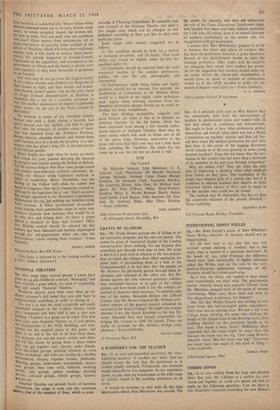N ATIONAL THEATRES S nt ,- -For some time, several people I know have
,given up an old childhood comfort, 'Monopoly,' and nave evolved a game which, for want of inspiration, theY call simply 'National Theatres.' Would-be players need little more than an or- lirlarY reformer's dull belief that you only have to Institutionalise something in order to change it. The aim is to take the most acceptable and easily asSeMbied elements in the London theatre, rustle 16Puilg ('Tenders' and then stuff it into a nice new Tenders' is a game on its own). You now ,n,ave your own National Theatre or, if you prefer, me headquarters of the NTB. Buildings and corn- triittees are the magical pieces in this game, and per, is no end to the fun to be had from them. or instance, you can get actors, writers and direc- off the streets by giving them a place where VeY can get together and : discuss, make friends, ave discussion groups, working relations or, even better, workshops, mix with one another in a healthy e.nvironment, discuss, organise forums, platforms, debating groups, table-tennis tournaments, discus-
fl groups, bars (one soft), billiards, working
jazz groups, poetry readings, Socialist grcmPs, coloured groups, Jewish groups, Queens' gr°111)s, etc. National Theatres can provide hours of harmless 2,11-insement, the range is wide and the variations 'less. One of the simplest of these, which is quite
amusing, is Choosing Committees. To assemble your own Council of the National Theatre, you need a few simple rules which can be changed or em- bellished, according to how you like to play your particular game. Some rough rules already suggested are as follows :
(1) The candidate should be both (a) a serious or imminent possibility, and (b) funny. Thus Lord Attlee, say, would be eligible under (a) but dis- qualified under Ib)•
(2) Candidates should be selected from the most successful reaches of the popular professions, politics, the law, the arts, photography and scholarship.
(3) Nominations, while being funny and highly probable, should not be obvious. For example, the
Archbishop of Canterbury or Sir William Haley would be a breach of the highly subtle techniques used. Again, when selecting members from the theatrical profession players should try to avoid in- cluding too many knighthoods.
The lines dividing probability, vulgarity and good humour are often so fine as to demand an arbitrary decision. In the list below, which has been canvassed from among a few already enthu- siastic players of National Theatres, there may be some names which will seem to break one or all of the above rules. However, newcomers to the game will soon find their own way and I wish them luck, including Mr. Findlater. His name has not come up in any list yet, but no doubt it will.'
NTB The Council Sir Malcolm Sargent, John Betjeman, C. A. Lejeune. Lady Pakenham, Sir Harold Nicolson, George Rylands, Norman Colin, Dame Margot Fontcyn. Sir Kenneth Clark, Jacquetta Hawkes, Sir Laurence Dunne, Alan Dent, Sir Michael Red- grave, Sir Tom O'Brien, Philip Hope-Wallace, Godfrey Winn, E. Martin Browne, Hardy Amics, Lord Esher, Cecil Beaton, John Sparrow, Dr. Gar- bett, Sir Anthony Eden, Miss Flora Robson. —Yours faithfully, JOHN OSBORNE John Osborne Productions Ltd., 23 Albemarle Street, Piccadilly, WI


















































 Previous page
Previous page